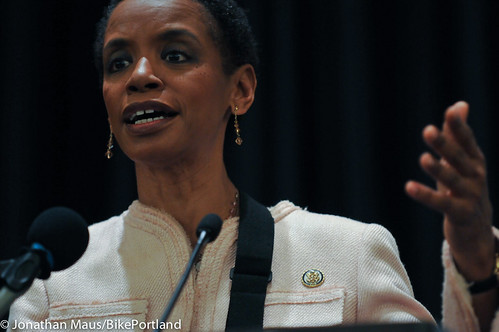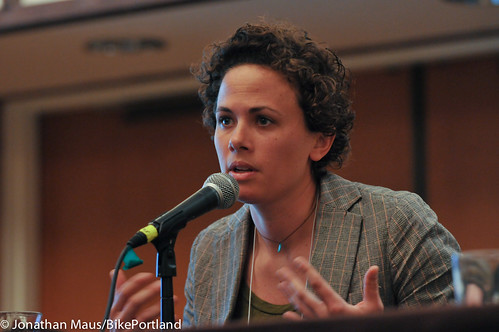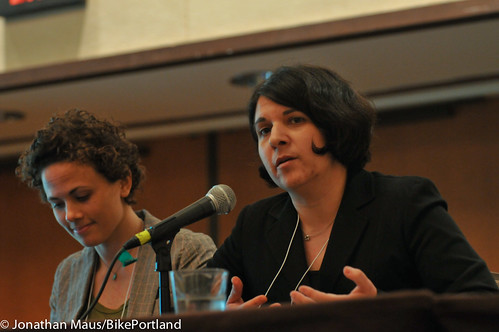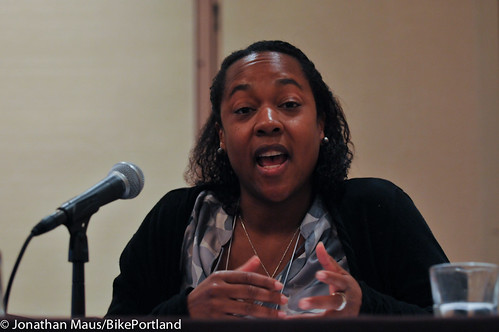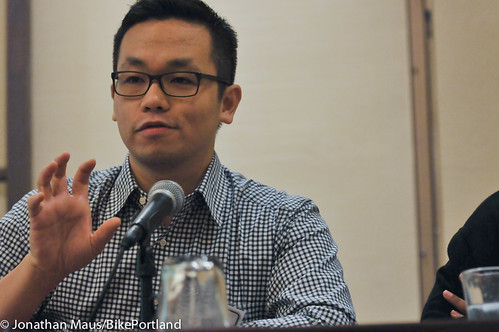This morning the National Bike Summit welcomed a new face to the usual litany of bike-supportive lawmakers that come here to fire up the crowd: House Representative Donna Edwards (D-MD).
Her presence was notable not just because she was a black woman on a stage with five white men; but she used the stage to emphasize an emerging theme in the national bike movement: equity and access for low-income neighborhoods and communities of color. After the opening plenary, one of the breakout sessions detailed the process and the progress of ‘Local Spokes,’ a promising coalition of advocacy groups working to broaden access to bicycling in New York City’s Lower East Side and Chinatown.
Setting the stage for that session, Rep. Edwards issued a challenge to the crowd:
“Next year when I come, I want you reaching out into communities like mine, where there are majorities of communities of color where we ride our bicycles too and we want clear air and water and all modes of transportation so we can go to and from work. We have work to do as advocates so we can make sure we have the most robust movement for all us, for all communities.”
That message is already in action for the Local Spokes Coalition. Just as we’ve seen the issue of equity take hold locally in Portland around our discussions of the N. Williams Avenue project, investments in East Portland, and in the work of the Community Cycling Center, bringing a broader range of ethnic groups and lower-income communities into the bicycling fold has emerged as a key theme here at the National Bike Summit and Local Spokes is a perfect example of how the equity anxiety that exists among planners and advocates is being translated into real, on-the-ground, grassroots action.
Local Spokes is a grant-funded coalition of nine different advocacy organizations. Representatives of four of those orgs were on a panel today titled, Building Successful Programs in Diverse Neighborhoods. The panelists included: Caroline Samponaro, Director of Bicycle Advocacy for Transportation Alternatives; Pasqualina Azzarello, Executive Director of Recycle-a-Bicycle; Douglas Le from Asian Americans for Equality; and Karyn Williams, Executive Director of Velo City.
Much of New York City’s extensive bikeway development in the past few years (a 2011 bike map shown during the presentation touted ’50 New Miles of Bikeways’) has taken place in the Lower East Side — a densely populated immigrant community where the average household income is $35,000 per year and a place with the highest proportion of public housing in all of New York City.
Caroline Samponaro explained that the Lower East Side/Chinatown area is, “the center of the city’s transportation network” and that it will be the “epicenter” of the beginning phase of New York City’s forthcoming bike share program. “The big picture,” she said, “Is to ensure that the community has an informed voice in decision-making.”
“The idea was to really listen, in a passive way, and be willing to hear thing we didn’t necessarily want to hear. Our interest was to have more bike infrastructure, but we were interested to hear what their priories were.”
— Karyn Williams, Velo City
What spurred Local Spokes, Pasqualina Azzarello said, was the “vast gap” she and other advocates noticed between the new transportation projects the City was implementing and the communities they were building them in.
To overcome that gap, the coalition came together, figured out a shared vision, and then set out to work. They created a survey (which was delivered in Spanish, English, and Chinese), they launched a youth ambassador program, and began a process of community brainstorming sessions with the goal to develop a concept plan for bicycling.
Instead of the standard operating procedure of a City planner coming into a community with a pre-determined agenda or project, the Local Spokes coalition decided to ask, listen, empower residents, and then work collaborative on solutions.
One of the toughest lessons for the advocates was to not only ask residents what they want for the future of bicycling — or whether they wanted bicycling at all — but to be ready to hear the answer. Azzarello, whose group has a similar approach to Portland’s Community Cycling Center, said they were prepared to “hear things that made us sad and that weren’t in line with what we believed in.”
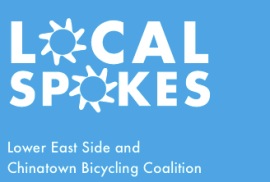
As an architect, Karyn Williams of Velo City said that when she hears about an urban problem her first instinct is, “What can we build? What can we design?” But through her work on the Local Motion project, she now realizes that, “The solution isn’t always building more bike lanes.” Williams also had reservations about what they might here when they asked residents about bicycling:
“The idea was to really listen, in a passive way, and be willing to hear thing we didn’t necessarily want to hear. Our interest was to have more bike infrastructure, but we were interested to hear what their priories were.”
While the process takes longer and might be more unsettling than the usual way projects are developed, Azzarello says the foundation they’ve laid has paid off big time. “What we found after going through this process was more rich and more meaningful and more useful than any agenda we could have gone into this process with,” she said, “It has been remarkable to know what this process can look like.”
During the Q & A that followed, a man in the crowd shared frustrations about this approach. “What’s frustrating to me as a planner,” he said, “is that, what if a neighborhood says they don’t want transit, when the master plan calls for transit. We need to set some basic values, it’s not all about letting 1,000 flowers bloom. Basic values matter.”
In response, Azzarello said that she was glad to hear this feedback and that success lies in “How we choose to implement our tools, there is a lot more leeway than we allow ourselves to recognize… It’s a back and forth, and allowing that to inform your vision makes for a much richer vision.”
To get a better sense of how their vision is taking off, watch the great video below about the youth ambassador program:

Local Motion hopes to unveil their concept plan in May during Bike to Work Month. Their work can definitely inform some neighborhoods in Portland and I was glad to see that Bicycle Transportation Alliance board member Stephen Gomez and Community Cycling Center Executive Director Alison Graves were not just in the audience, but they both asked questions and talked with the panelists afterwards.
— This is ongoing coverage of the 2012 National Bike Summit, which is being brought to you by Planet Bike.



